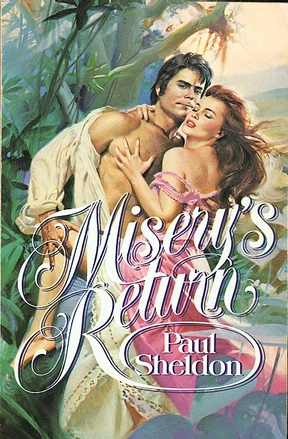Granted, it's the quality that really should count rather than the quantity yet it is a nice start to the new year to have a small accomplishment tucked under my bookish belt. Instead of going over each book that I've read thus far, I thought that a deep dive into one that I read for the second time would suit the occasion best.
While I do tend to add a Stephen King reread to these challenges(such as The Gunslinger, which will be featured in my first Series-ous Reading 2 post later this season), most of those are books that I haven't picked up for many years. Finders,Keepers is a much more current read but one that really needed another look at right away for me.
This novel is the second installment of King's Bill Hodges trilogy, that began with Mr. Mercedes and fittingly finished up with End of Watch.
While Finders,Keepers is meant to be the meat of this particular story sandwich, at most times, it really feels like a dinner for one that just happened to be included on the Mr. Mercedes menu. I don't consider that a negative at all, in fact it's the strength of the book.
The central spoke of the plot wheel here is about a legendary writer,John Rothstein, (sort of a cross between J.D. Salinger and John Updike)who became a recluse after completing his trio of Runner novels featuring his rebellious hero Jimmy Gold. One night, Rothstein is awoken by a gang of home invaders, with one of them interested in more than just the money stockpiled in the house.
That introduces us to Morris Bellamy, an always angry young man barely out of his teens who latched on to Rothstein's Jimmy Gold as his personal icon.
Driven by his disappointment in the final Runner novel, where Jimmy seems to settle into standard suburban life, Morris wants to punish Rothstein for letting Jimmy "sell out" and his level of fury sparks enough of Rothstein's own tank of rage fuel to the point where Morris kills him, something his less than literary inclined partners expected.
Morris, as it turns out, is quite the sociopath with a blend of psychopath tossed in for good measure as his background of middle class resentment comes complete with an abandoning father, a mother with dreams of her own crushed and eager to crush her son's illusions about Jimmy Gold as well, plus a tendency to be a black out drunk with violent impulses.
However, Morris is stone cold sober when he kills Rothstein and then later, his two cohorts in crime, eager to do nothing more than hole up somewhere to read all of the hidden notebooks recovered from Rothstein's safe. That plan goes awry when Morris winds up in prison for a different yet just as heinous crime, with the only thing holding his interest in life is the thought of those Rothstein notebooks hidden away(along with a good amount of cash) in a trunk and buried under a tree near his childhood home.
Decades later, Morris finally receives parole and his only goal is to get his hands on his personal buried treasure. When, to his horror, he discovers that the contents of the trunk have already been claimed by another, Morris sets out on a course that he believes is righteous revenge.
This unwavering conviction of his, that he is entitled to those notebooks, shows that despite his advancing years and grey hair replacing his once vivid red locks, Morris is still the same twisted teenager who takes the catch phrase of Jimmy Gold "shit don't mean shit" as a license to do ill onto anyone who gets in his way:
The true hero of this novel is,fortunately, Peter Saubers, who finds the trunk by accident at age 13 and at first, is only interested in the money.
With his family in dire financial circumstances(due in part to his father being one of the victims of the City Center attack in Mr. Mercedes) and the strong possibility of his parents close to getting a divorce, Peter figures out a way to send small payments to his folks over the course of several years.
The money is a secret blessing that gets them through the tough times yet when Peter's younger sister Tina wants to attend a good private school, the cash cache has dried up. During this time, Peter has read the notebooks(that contained two more Jimmy Gold novels that change the course of the character) and becomes a major fan of John Rothstein's work.
While he would prefer to donate the Rothstein writings to a literary institute, the need to help his sister out drives Peter to try and sell a few of the notebooks to an unscrupulous rare book dealer. That plan goes down a dangerous road as Morris Bellamy learns of Peter's possession of the notebooks and brutally targets him and his family.
At one point, a casual reference is made to John D. MacDonald's thriller, The Executioners, which was adapted into the classic thriller movie Cape Fear(not to mention remade by Martin Scorsese back in the 90s). King slips that in for a reason and not just because he's a fan of John D. there.
The plot of that book revolves around a lawyer who did wrong by a client who he knew was guilty. When the client is released from prison and full of righteous fury, the lawyer finds himself on the defense,along with his family, in a true literal sense. Peter's actions towards the money and even the notebooks is understandable yet like the lawyer in Cape Fear, he has to face off against a determined enemy who feels that Peter has wronged him and all must pay:
That's when Bill Hodges and friends step in to help,which does work out well into fitting this story into that particular fictional universe.
While I have a sneaking suspicion that Stephen King had this novel on the back burner for awhile and felt that it would be easier to slip it into this trilogy, that gives the reader an unexpected surprise jolt into thriller country and makes this part two all the more interesting there.
It also plays upon the theme of reader obsession, one that King has touched on earlier with Misery. I like that both Morris Bellamy and Annie Wilkes are two tainted peas in a pod when it comes to their favorite characters as it shows that deadly devotion to fictional worlds cuts across class lines.
After all, just as many folks fixated on The Catcher in the Rye and ill-used it as dark motivation for their evil deeds as any mainstream genre title has been. Peter finds himself not only afraid of what Morris will do, he also fears becoming just like him with the Rothstein books as well.
Yes, Misery and Finders,Keepers do make for unlikely bookends but they do fit scarily together. If those two "number one fans" ever did meet, Morris would probably sneer at Annie's beloved Misery as a "commercial sell-out", but that would be to his peril indeed:
So, all in all, Finders,Keepers was a riveting read well worth revisiting. While I did enjoy that thrill ride, I am relieved to be in much calmer waters with Heather Cocks and Jessica Morgan's The Royal We.
Don't get me wrong, I had fun with FK and it was also exhilarating to climb aboard Murder on the Orient Express with Agatha Christie, not to mention get reacquainted with King's Gunslinger. Yet, with everything going in the world these days, a nice mental vacation is necessary.
Going to this book right after Daisy Goodwin's Victoria(finished in time for the season two premiere of the PBS series) is just delightful. This unlikely romance between American college girl Bex and future Brit king Nick is smart and funny, with plenty of verbal charm exchanged freely.
In a way, this novel puts me in mind of those later seasons of Gilmore Girls, when Rory hung out with the Life and Death Brigade(of which I am not a fan and any book that can make me think fondly of them is a success with me) and Logan,of course. Hopefully, Bex and Nick will have a better romantic ending than those two yet just as well written:





No comments:
Post a Comment